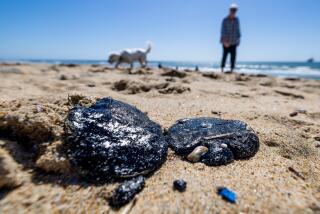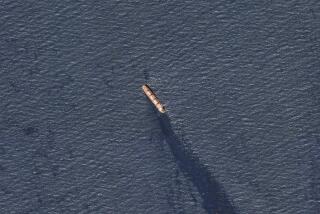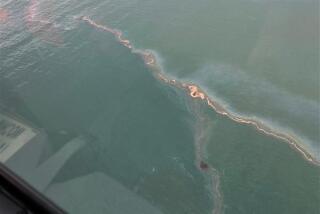Gulf Slick Reported Spreading; Concerns Rise
- Share via
DHAHRAN, Saudi Arabia — The massive Persian Gulf oil slick that appeared once to have stagnated and shrunk was reported spreading southward Tuesday, raising renewed concern over the welfare of marine wildlife and operations at the world’s largest water desalination plant.
Environmentalists and Saudi authorities had hoped that the bulk of the vast slick would spread no farther after it apparently began collecting in a pocket-like area along the Gulf coast known as Dawhat ad Dafi.
But on Tuesday, U.S. Coast Guard officials said that patches of oily “mousse” had rounded the east coast of Abu Ali island and appeared to be drifting in the direction of the desalination plant at Jubayl, 18 miles away.
Within hours, Saudi officials also reported seeing a “light sheen” of oil in the waters off Jubayl.
However, a spokeswoman for the kingdom’s Meteorology and Environmental Protection Administration denied that the plant is threatened. Given precautions that have been taken, said spokeswoman Jennifer Freedman, there is little chance that the Jubayl facility would be forced to shut down even if assaulted by crude oil.
Defensive rubber booms were strung weeks ago and filters were installed outside each of the plant’s half-dozen underwater intake areas in anticipation of the slick’s approach, Freedman said.
Authorities are also considering using biological dispersants and subsurface nets to catch tar balls before they can be sucked into the plant, which provides fresh water to the 2 million people of Riyadh, the Saudi capital.
Of greater immediate concern is the potential effect of the spreading oil on the region’s already devastated migratory birds and other marine animals.
The spill began Jan. 23 when, according to U.S. military commanders, Iraqi troops occupying Kuwait opened the spigot on an offshore oil terminal, sending perhaps as much as 2 million barrels of petroleum flowing into the Gulf.
More to Read
Sign up for Essential California
The most important California stories and recommendations in your inbox every morning.
You may occasionally receive promotional content from the Los Angeles Times.













